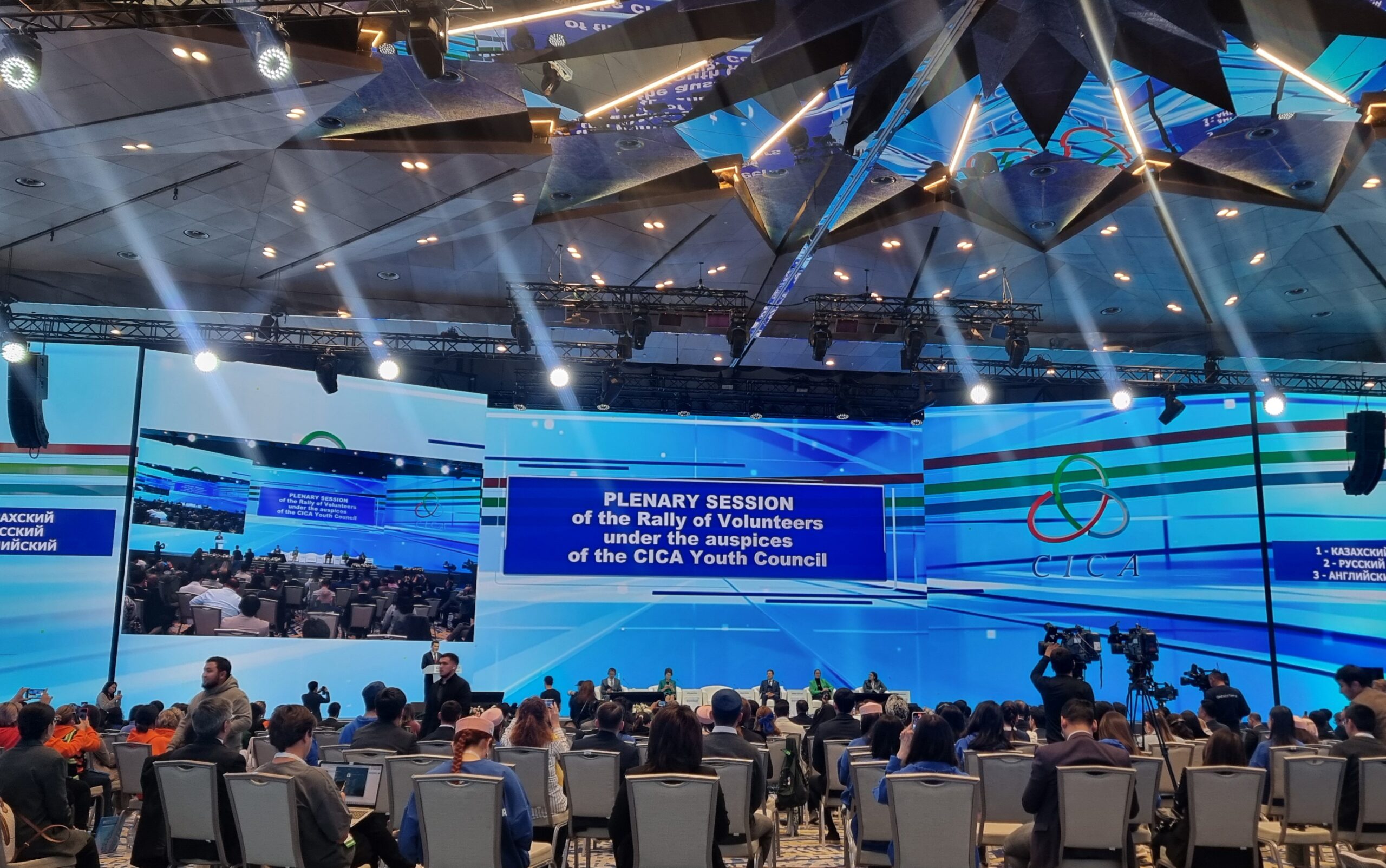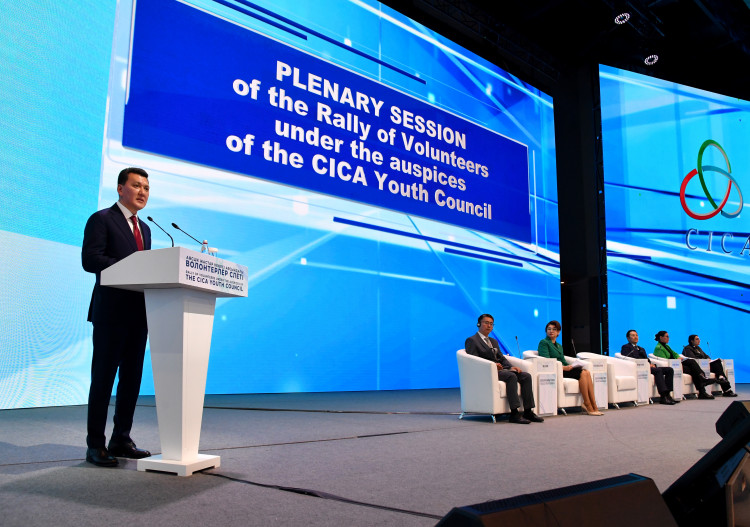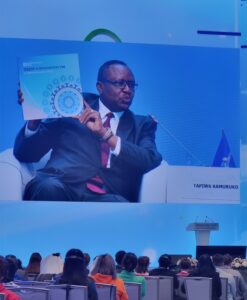ASTANA – Kazakhstan hosted a two-day meeting of volunteer movement leaders within the Conference on Interaction and Confidence-Building Measures in Asia (CICA) Youth Council on Oct. 3-4 in Astana. The event focused on the importance of volunteerism in society and its role in promoting sustainable development across Asia.

The Conference on Interaction and Confidence-Building Measures in Asia (CICA) Youth Council was held on Oct. 3-4 in Astana. Photo credit: The Astana Times
Participants explored a range of topics, including the role of volunteers in emergency situations, their contributions to addressing environmental challenges, social and inclusive volunteering, the role of volunteers on the international stage, and their impact on the healthcare sector.
Solidarity in action
In his address to the participants, State Counselor of Kazakhstan Erlan Karin emphasized that supporting the development of the volunteer movement is a key priority in President Kassym-Jomart Tokayev’s policies.

State Counselor of Kazakhstan Erlan Karin. Photo credit: Akorda
He highlighted the President’s acknowledgement of the crucial role volunteers play in advancing social justice and strengthening unity and solidarity within society.
Karin recalled the significant contribution volunteers made during the COVID-19 pandemic, with around 500,000 Kazakh citizens participating in volunteer activities.
“Similarly, during recent natural and man-made emergencies, people demonstrated solidarity once again. Thanks to the joint efforts of government agencies, public associations, youth, and volunteer organizations, as well as thousands of caring people, we were able to manage the largest spring floods in the last 80 years,” said Karin.
He also praised volunteers’ contributions to the country’s environmental initiative, Taza Kazakhstan (Clean Kazakhstan), supported by Tokayev.
“This initiative has helped foster a high level of environmental awareness in our society, promoting values of hard work and respect for the environment,” he said.
“Our volunteers did not just help locally: during the devastating earthquakes in Türkiye, they sent over 500 tons of humanitarian aid,” added Karin.
Kazakhstan initiated the United Nations General Assembly’s declaration of 2026 as the International Year of Volunteers for Sustainable Development, an idea first proposed by Tokayev at the 75th session of the UN General Assembly in 2020.
Karin stressed that 2026 will provide a significant boost to volunteer movements worldwide, opening up new opportunities for international cooperation and defining key directions for the future of volunteerism.
“This year will allow volunteers to play a critical role in advancing the Sustainable Development Goals (SDGs) and creating a fair and prosperous world,” he said.
CICA Secretary General Kairat Sarybay echoed these sentiments, noting the discussions held during the seventh meeting of the CICA Youth Council on integrating volunteerism into the human dimension of CICA’s confidence-building measures.
He expressed optimism about ongoing talks with the UN and announced plans for a side event at the UN headquarters in New York to further develop joint educational programs and volunteer training.
Sarybay also emphasized the importance of recognizing the contributions of volunteers through awards and honors, a practice already established in Kazakhstan.
Insights from UNV on the future of volunteerism
In an interview with The Astana Times, Tapiwa Kamuruko, Chief of the Voluntary Advisory Services Section at the United Nations Volunteers (UNV) program headquarters in Bonn, outlined the ongoing plans for the International Year of Volunteers, encouraging member states and volunteer organizations to begin preparations for this important milestone.
He stressed that the year would be dedicated to amplifying and recognizing the vital contributions of volunteers worldwide.

Tapiwa Kamuruko, Chief of the Voluntary Advisory Services Section at the United Nations Volunteers program, presented the State of Volunteering in Central Asia Review. Photo credit: The Astana Times
“Volunteers are often the first responders when disaster strikes and play a critical role in achieving the SDGs. Without their selfless efforts, the world would struggle to function. Volunteerism is deeply rooted in our cultures and traditions, and I have learned that it’s woven into the fabric of society here as well,” he said.
Kamuruko also highlighted that in 2027, an evaluation will be conducted to document the impact of volunteers during 2026.
“This will be a significant step, especially considering that, in 2022, there were nearly 63 million active volunteers worldwide. If they were a country, their collective impact would be remarkable,” he said.
Kamuruko also spoke about the importance of measuring volunteers’ contributions through the Volunteer Index, which is being developed to capture the diverse and profound impact of volunteerism on the SDGs.
“This is not just about numbers. It is about crafting a nuanced narrative that reflects the full spectrum of a volunteer’s contribution. It is about acknowledging both the tangible outcomes and the intangible ripples of change that volunteers create in achieving the SDGs,” he said.
During the event, Kamuruko presented the first review on the state of volunteering in Central Asia, showcasing the evolution of volunteering practices and the impact of volunteer efforts. The review emphasized the value of volunteers’ contributions and identified best practices in Central Asia’s volunteer movement.
The event brought together 450 delegates from 21 countries, including officials responsible for volunteering and youth policy from CICA member states, diplomatic mission representatives, as well as leaders of volunteer organizations and active volunteers.
